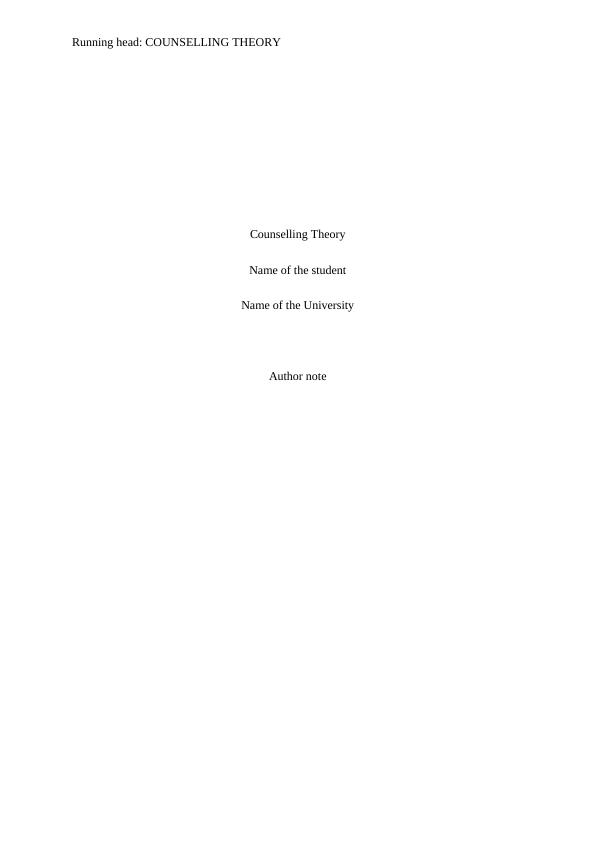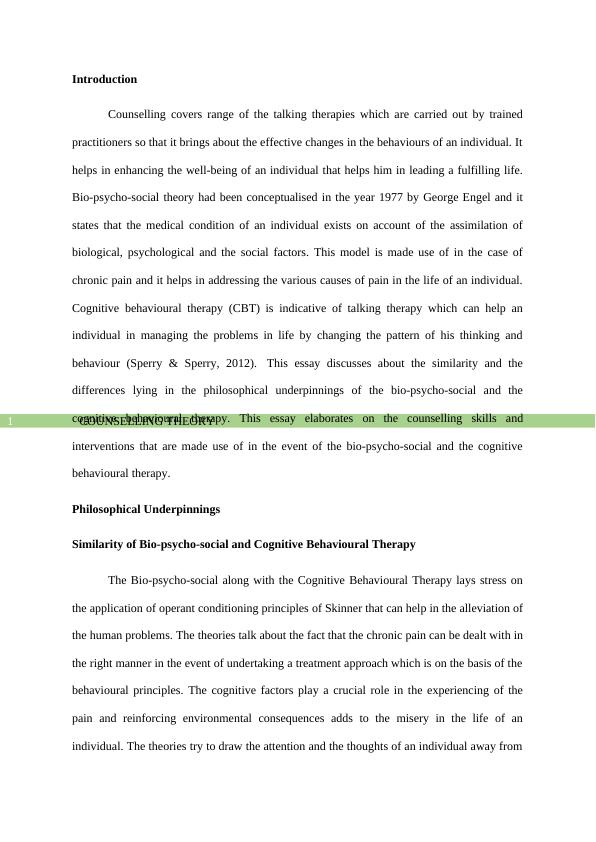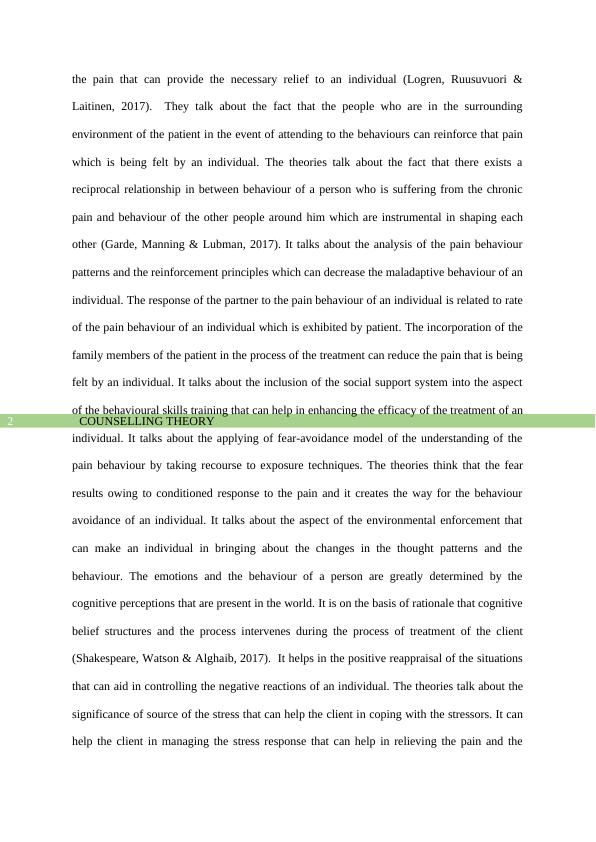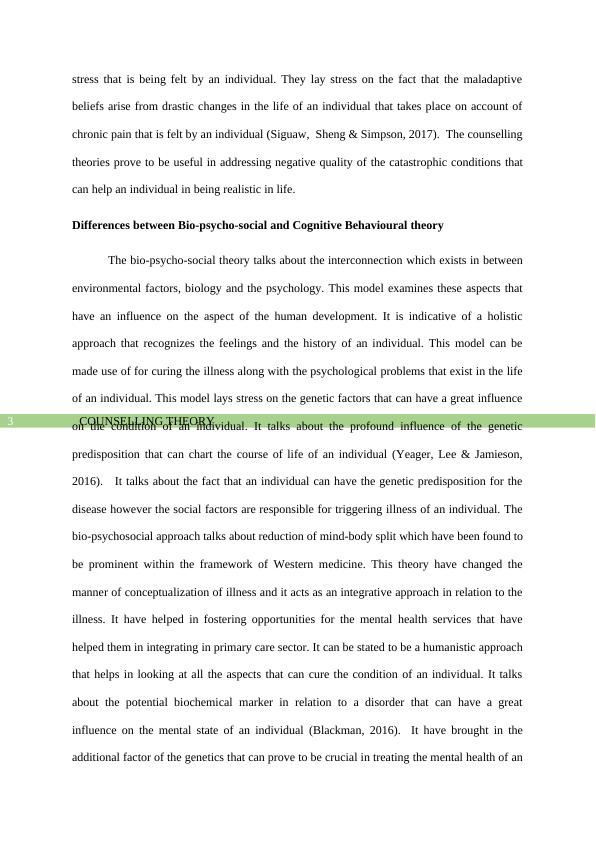Counselling Theory | Report
Added on 2022-09-08
13 Pages4034 Words26 Views
Running head: COUNSELLING THEORY
Counselling Theory
Name of the student
Name of the University
Author note
Counselling Theory
Name of the student
Name of the University
Author note

COUNSELLING THEORY1
Introduction
Counselling covers range of the talking therapies which are carried out by trained
practitioners so that it brings about the effective changes in the behaviours of an individual. It
helps in enhancing the well-being of an individual that helps him in leading a fulfilling life.
Bio-psycho-social theory had been conceptualised in the year 1977 by George Engel and it
states that the medical condition of an individual exists on account of the assimilation of
biological, psychological and the social factors. This model is made use of in the case of
chronic pain and it helps in addressing the various causes of pain in the life of an individual.
Cognitive behavioural therapy (CBT) is indicative of talking therapy which can help an
individual in managing the problems in life by changing the pattern of his thinking and
behaviour (Sperry & Sperry, 2012). This essay discusses about the similarity and the
differences lying in the philosophical underpinnings of the bio-psycho-social and the
cognitive behavioural therapy. This essay elaborates on the counselling skills and
interventions that are made use of in the event of the bio-psycho-social and the cognitive
behavioural therapy.
Philosophical Underpinnings
Similarity of Bio-psycho-social and Cognitive Behavioural Therapy
The Bio-psycho-social along with the Cognitive Behavioural Therapy lays stress on
the application of operant conditioning principles of Skinner that can help in the alleviation of
the human problems. The theories talk about the fact that the chronic pain can be dealt with in
the right manner in the event of undertaking a treatment approach which is on the basis of the
behavioural principles. The cognitive factors play a crucial role in the experiencing of the
pain and reinforcing environmental consequences adds to the misery in the life of an
individual. The theories try to draw the attention and the thoughts of an individual away from
Introduction
Counselling covers range of the talking therapies which are carried out by trained
practitioners so that it brings about the effective changes in the behaviours of an individual. It
helps in enhancing the well-being of an individual that helps him in leading a fulfilling life.
Bio-psycho-social theory had been conceptualised in the year 1977 by George Engel and it
states that the medical condition of an individual exists on account of the assimilation of
biological, psychological and the social factors. This model is made use of in the case of
chronic pain and it helps in addressing the various causes of pain in the life of an individual.
Cognitive behavioural therapy (CBT) is indicative of talking therapy which can help an
individual in managing the problems in life by changing the pattern of his thinking and
behaviour (Sperry & Sperry, 2012). This essay discusses about the similarity and the
differences lying in the philosophical underpinnings of the bio-psycho-social and the
cognitive behavioural therapy. This essay elaborates on the counselling skills and
interventions that are made use of in the event of the bio-psycho-social and the cognitive
behavioural therapy.
Philosophical Underpinnings
Similarity of Bio-psycho-social and Cognitive Behavioural Therapy
The Bio-psycho-social along with the Cognitive Behavioural Therapy lays stress on
the application of operant conditioning principles of Skinner that can help in the alleviation of
the human problems. The theories talk about the fact that the chronic pain can be dealt with in
the right manner in the event of undertaking a treatment approach which is on the basis of the
behavioural principles. The cognitive factors play a crucial role in the experiencing of the
pain and reinforcing environmental consequences adds to the misery in the life of an
individual. The theories try to draw the attention and the thoughts of an individual away from

COUNSELLING THEORY2
the pain that can provide the necessary relief to an individual (Logren, Ruusuvuori &
Laitinen, 2017). They talk about the fact that the people who are in the surrounding
environment of the patient in the event of attending to the behaviours can reinforce that pain
which is being felt by an individual. The theories talk about the fact that there exists a
reciprocal relationship in between behaviour of a person who is suffering from the chronic
pain and behaviour of the other people around him which are instrumental in shaping each
other (Garde, Manning & Lubman, 2017). It talks about the analysis of the pain behaviour
patterns and the reinforcement principles which can decrease the maladaptive behaviour of an
individual. The response of the partner to the pain behaviour of an individual is related to rate
of the pain behaviour of an individual which is exhibited by patient. The incorporation of the
family members of the patient in the process of the treatment can reduce the pain that is being
felt by an individual. It talks about the inclusion of the social support system into the aspect
of the behavioural skills training that can help in enhancing the efficacy of the treatment of an
individual. It talks about the applying of fear-avoidance model of the understanding of the
pain behaviour by taking recourse to exposure techniques. The theories think that the fear
results owing to conditioned response to the pain and it creates the way for the behaviour
avoidance of an individual. It talks about the aspect of the environmental enforcement that
can make an individual in bringing about the changes in the thought patterns and the
behaviour. The emotions and the behaviour of a person are greatly determined by the
cognitive perceptions that are present in the world. It is on the basis of rationale that cognitive
belief structures and the process intervenes during the process of treatment of the client
(Shakespeare, Watson & Alghaib, 2017). It helps in the positive reappraisal of the situations
that can aid in controlling the negative reactions of an individual. The theories talk about the
significance of source of the stress that can help the client in coping with the stressors. It can
help the client in managing the stress response that can help in relieving the pain and the
the pain that can provide the necessary relief to an individual (Logren, Ruusuvuori &
Laitinen, 2017). They talk about the fact that the people who are in the surrounding
environment of the patient in the event of attending to the behaviours can reinforce that pain
which is being felt by an individual. The theories talk about the fact that there exists a
reciprocal relationship in between behaviour of a person who is suffering from the chronic
pain and behaviour of the other people around him which are instrumental in shaping each
other (Garde, Manning & Lubman, 2017). It talks about the analysis of the pain behaviour
patterns and the reinforcement principles which can decrease the maladaptive behaviour of an
individual. The response of the partner to the pain behaviour of an individual is related to rate
of the pain behaviour of an individual which is exhibited by patient. The incorporation of the
family members of the patient in the process of the treatment can reduce the pain that is being
felt by an individual. It talks about the inclusion of the social support system into the aspect
of the behavioural skills training that can help in enhancing the efficacy of the treatment of an
individual. It talks about the applying of fear-avoidance model of the understanding of the
pain behaviour by taking recourse to exposure techniques. The theories think that the fear
results owing to conditioned response to the pain and it creates the way for the behaviour
avoidance of an individual. It talks about the aspect of the environmental enforcement that
can make an individual in bringing about the changes in the thought patterns and the
behaviour. The emotions and the behaviour of a person are greatly determined by the
cognitive perceptions that are present in the world. It is on the basis of rationale that cognitive
belief structures and the process intervenes during the process of treatment of the client
(Shakespeare, Watson & Alghaib, 2017). It helps in the positive reappraisal of the situations
that can aid in controlling the negative reactions of an individual. The theories talk about the
significance of source of the stress that can help the client in coping with the stressors. It can
help the client in managing the stress response that can help in relieving the pain and the

COUNSELLING THEORY3
stress that is being felt by an individual. They lay stress on the fact that the maladaptive
beliefs arise from drastic changes in the life of an individual that takes place on account of
chronic pain that is felt by an individual (Siguaw, Sheng & Simpson, 2017). The counselling
theories prove to be useful in addressing negative quality of the catastrophic conditions that
can help an individual in being realistic in life.
Differences between Bio-psycho-social and Cognitive Behavioural theory
The bio-psycho-social theory talks about the interconnection which exists in between
environmental factors, biology and the psychology. This model examines these aspects that
have an influence on the aspect of the human development. It is indicative of a holistic
approach that recognizes the feelings and the history of an individual. This model can be
made use of for curing the illness along with the psychological problems that exist in the life
of an individual. This model lays stress on the genetic factors that can have a great influence
on the condition of an individual. It talks about the profound influence of the genetic
predisposition that can chart the course of life of an individual (Yeager, Lee & Jamieson,
2016). It talks about the fact that an individual can have the genetic predisposition for the
disease however the social factors are responsible for triggering illness of an individual. The
bio-psychosocial approach talks about reduction of mind-body split which have been found to
be prominent within the framework of Western medicine. This theory have changed the
manner of conceptualization of illness and it acts as an integrative approach in relation to the
illness. It have helped in fostering opportunities for the mental health services that have
helped them in integrating in primary care sector. It can be stated to be a humanistic approach
that helps in looking at all the aspects that can cure the condition of an individual. It talks
about the potential biochemical marker in relation to a disorder that can have a great
influence on the mental state of an individual (Blackman, 2016). It have brought in the
additional factor of the genetics that can prove to be crucial in treating the mental health of an
stress that is being felt by an individual. They lay stress on the fact that the maladaptive
beliefs arise from drastic changes in the life of an individual that takes place on account of
chronic pain that is felt by an individual (Siguaw, Sheng & Simpson, 2017). The counselling
theories prove to be useful in addressing negative quality of the catastrophic conditions that
can help an individual in being realistic in life.
Differences between Bio-psycho-social and Cognitive Behavioural theory
The bio-psycho-social theory talks about the interconnection which exists in between
environmental factors, biology and the psychology. This model examines these aspects that
have an influence on the aspect of the human development. It is indicative of a holistic
approach that recognizes the feelings and the history of an individual. This model can be
made use of for curing the illness along with the psychological problems that exist in the life
of an individual. This model lays stress on the genetic factors that can have a great influence
on the condition of an individual. It talks about the profound influence of the genetic
predisposition that can chart the course of life of an individual (Yeager, Lee & Jamieson,
2016). It talks about the fact that an individual can have the genetic predisposition for the
disease however the social factors are responsible for triggering illness of an individual. The
bio-psychosocial approach talks about reduction of mind-body split which have been found to
be prominent within the framework of Western medicine. This theory have changed the
manner of conceptualization of illness and it acts as an integrative approach in relation to the
illness. It have helped in fostering opportunities for the mental health services that have
helped them in integrating in primary care sector. It can be stated to be a humanistic approach
that helps in looking at all the aspects that can cure the condition of an individual. It talks
about the potential biochemical marker in relation to a disorder that can have a great
influence on the mental state of an individual (Blackman, 2016). It have brought in the
additional factor of the genetics that can prove to be crucial in treating the mental health of an

End of preview
Want to access all the pages? Upload your documents or become a member.
Related Documents
Counselling in a community service settinglg...
|8
|2281
|52
Psychology Assignment: Counsellinglg...
|10
|3341
|68
Effectiveness of Cognitive Behavioral Therapy (CBT) in Counsellinglg...
|8
|2543
|24
Theories of Counsellinglg...
|8
|2692
|370
Social Construction Models II: Narrative Therapylg...
|6
|1116
|80
Theories of Counseling: Cognitive Behavioral Therapy and Gestalt Therapylg...
|10
|3133
|485
